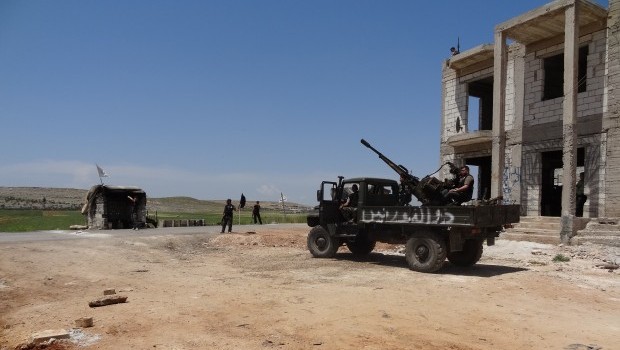
Fighters from the Free Syrian Army man a roadblock north of Aleppo on June 5, 2013. (Asharq Al-Awsat photograph)
Armed opposition fighters in Anadan repelled an attack from the Shi’ite towns of Nubl and Zahraa, whose fighters tried to infiltrate the area at night to raise the regime’s flag over the hills near Anadan, the largest settlement in Aleppo’s suburbs. Three armed opposition groups, Free Syria, Al-Tawheed and Rijaluallah (God’s Men), whose fighters come from Anadan, Hraytan and Bayanon, responded and forced the Shi’ite fighters to withdraw.
Anadan’s residents say that they are living in an atmosphere of suspicion, expecting to be stabbed in the back by the two Shi’ite towns. The most recent development, however, is the growing suspicion that their Kurdish neighbors have now joined the conflict. Fighters from the village of Zuq, which is adjacent to Nubl, were accused of providing safe passage for the withdrawing Nubl fighters, breaking an agreement to remain neutral.
Mohammad Blo, spokesman of the Free Syria Brigade, said: “We have not confirmed yet whether the Kurds had supported the Nubl Shabiha [literally “ghosts,” the nickname for the pro-government militia], but many of our fighters said bullets were coming from behind. We met a Kurdish military leader from the Kurdish Democratic Union Party (PYD), and he denied that any of his fighters had cooperated with mercenaries from Nubl or Zahraa, and that they had maintained neutrality.”
Nonetheless, residents’ suspicions about a possible Kurdish role endure. A few days ago, armed Kurds belonging to the Kurdish Popular Protection Units in Syria killed a prominent leader from the Al-Tawhid Brigade when he raised suspicions regarding the movement of supplies to the besieged village of Zahraa via a Kurdish roadblock, leading to a clash that resulted in the death of Mahmoud Hafiz Isa (also known as “Shamel”) and nine of his men. This resulted in an angry reaction from the FSA, who launched an attack on the Kurds in Aqibah and Ziyarah towns, after accusing them of being “agents of the Kurdistan Workers’ Party and the Syrian regime,” and that they were collaborating with the villages of Nubl and Zahraa.
Ahmad Afash, commander of the Free Syria Brigade, said he had evidence of Iranian arms and training support for the residents of Nubl and Zahraa. He stated three conditions local fighters have imposed on both villages to lift the siege: “Handing over the shabiha of the Al-Bajj clan, surrendering the arms supplied by the regime to Nubl and Zahraa, and handing back the detainees from our villages in a prisoner exchange deal.”
Afash said that unless those conditions are met, “we will never lift the siege. We can destroy the two villages with artillery and mortars, but we know there are civilians there and we do not want them to suffer what we suffered at the hands of Assad’s gangs, whom they support.”
However, Shi’ite cleric Ali Al-Zamm from Nubl, who was in charge of the prisoner-exchange negotiations with Afash a few months ago, said these conditions were impossible to meet: “I could not hand over my cousin or one of the people of my village. We will fight in defense of our village. We have been under siege for months, and we have exhausted all possible avenues for a peaceful solution.”
Zamm was furious and uncompromising. When I spoke to him by telephone a few months ago, he was more diplomatic and flexible, and was hopeful of finding a peaceful solution and stressed the importance of “coexistence.”
Maybe what made him angrier was his own kidnapping. I called him a few months ago, but the reply came from his son, Dr. Abdulmurtada, who runs a media bureau in Nubl. I asked him where Ali was. He replied, “Ali was kidnapped in the Hayyan village.” A few days later, he was released. When he told me what happened, he said: “I went to negotiate the exchange of prisoners between us and Hayyan village, but they held me and took my money. After a few days, they released me, but so far [they] have not returned my car.”
All direct communication between the two sides ended that day, and social media websites in Nubl and Zahraa began to attack the revolutionaries of the neighboring villages, publishing pictures of Assad and Nasrallah on their Facebook walls.
This tense atmosphere shows that the conflict has turned into a sectarian conflict between the majority Sunnis on the one hand and the minority Alawites and their allies from other Shi’ite sects on the other.
Since the beginning of the peaceful revolution, the residents of the two Shi’ite villages declared their support for the regime, in contrast to the surrounding Sunni towns and villages, which were no longer controlled by the regular army. This led to the escape of around 200 “Sunni shabiha” to Nubl and Zahraa, from nearby villages in the northern suburbs. The shabiha of the Al-Bajj clan who escaped from the village of Hayyan are the source of the dispute.
Nubl and Zahraa notables refused to hand over the Al-Bajj clan shabiha to the FSA. The fighters of the nearby Sunni villages then laid laid siege to Nubl and Zahraa. Since the highway in the northern suburbs of Aleppo was under the control of the rebels, the Assad regime was forced to use helicopters to deliver large quantities of weapons, ammunition and food to the two villages.
The residents of Anadan exchange light-hearted comments about the helicopters that arrived daily, calling them the “Nubl taxis” in reference to the regime’s failure to reach them.
